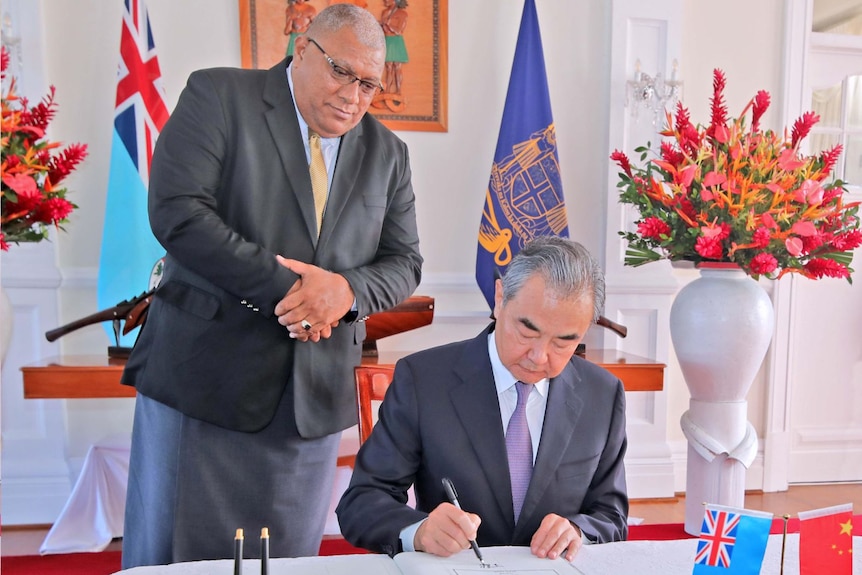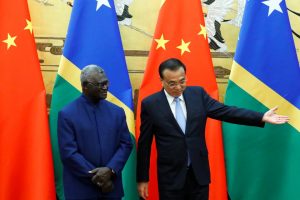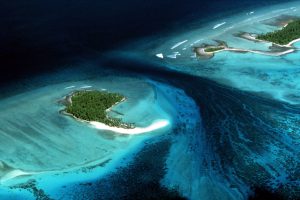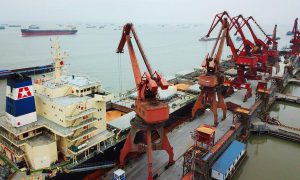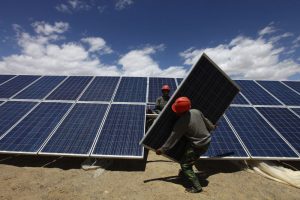Pacific Island nations failed on Monday to reach a consensus on a regional trade and security agreement with China.
Fijian Prime Minister Frank Bainimarama said Pacific nations were united in the sense that “we put consensus first among our countries throughout any discussion on new regional agreements”.
China’s Foreign Minister Wang Yi urged the Pacific region not to be “too anxious” about his country’s aims after a meeting with his counterparts from 10 island nations deferred consideration of the sweeping trade and security communique.
Wang hosted the video link-up with foreign ministers from island nations with diplomatic ties with China midway through a tour of the region, where Beijing’s ambitions for wider security ties has caused concern among US allies.
A draft communique and five-year action plan sent by China to the invited nations ahead of the meeting prompted opposition from at least one of the invited nations, Federated States of Micronesia, according to a letter leaked last week.
Other nations wanted it amended or a decision delayed, an official from one Pacific country told Reuters before the meeting.
After the meeting, which included Samoa, Tonga, Kiribati, Papua New Guinea, Vanuatu, Solomon Islands, Niue and Vanuatu, Wang said further discussions were needed to shape more consensus.
“China will release its own position paper on our own positions and propositions and cooperation proposals with Pacific island countries, and going forward we will continue to have ongoing and in-depth discussions and consultations to shape more consensus on cooperation,” he told reporters in Fiji.
Wang said some had questioned China’s motives in being so active in the Pacific islands, and his response was China supported developing countries in Africa, Asia and the Caribbean also.
ALSO SEE: China-Solomons Pact’s Lack of ‘Transparency’ Worries US
‘Don’t be Too Nervous’
“Don’t be too anxious and don’t be too nervous, because the common development and prosperity of China and all the other developing countries would only mean great harmony, greater justice and greater progress of the whole world,” he said.
China’s ambassador to Fiji, Qian Bo, said while answering questions after the briefing that participants had agreed to discuss the draft communique and the five-year plan “until we have reached an agreement.”
“There has been general support from the 10 countries with which we have diplomatic relations, but of course there are some concerns on some specific issues.”
He didn’t identify the areas of concern. The wide-ranging draft communique had proposed security exchanges, cyber security cooperation, China training police, and a free trade zone in a region where US ally Australia has been the biggest aid donor and traditional security partner.
Climate Change
The secretary general of the Pacific Islands Forum, Henry Puna, urged China at the meeting to work with the region on its priorities, which were climate change and Covid-19 recovery, and through its agreed mechanisms, according to a statement from the forum.
It is the region’s main grouping, with 18 members including nations that have diplomatic ties with Taiwan and not Beijing.
Two nations aligned to Taiwan, Palau and Tuvalu, have recently said they are concerned that Pacific islands would become pawns in superpower competition.
“We are all well aware of the increasing intensity of geopolitical manoeuvring in our region today. Indeed, the recent influx of high-level visits to our Blue Pacific demonstrates the increasing value that our partners, including China, must place on our collective ability to think, live, engage and deliver,” Puna told the meeting, according to the statement.
Fiji’s Prime Minister Frank Bainimarama told reporters after the meeting: “Geopolitical point-scoring means less than little to anyone whose community is slipping beneath the rising seas, whose job is being lost to the pandemic, or whose family is impacted by the rapid rise in the price of commodities.
“Fiji will continue to seek fertile ground for our bilateral relationship. The challenges our people face will only intensify until collective solutions rise to meet them.”
Mr Bainimarama said he sought a stronger commitment from China on climate action and cutting emissions, as he did with all world leaders.
Concern over Military Presence
The United States, Australia, Japan and New Zealand have expressed concern about a security pact signed by the Solomon Islands with China last month, saying it had regional consequences and could lead to a Chinese military presence close to Australia and in a strategic position in the Pacific.
In Honiara last week, Wang condemned interference in the deal and said the Solomon Islands’ relationship with China was a model for other Pacific island nations.
Wang will travel to the South Pacific kingdom of Tonga for a two-day visit on Tuesday.
• Reuters with additional editing by Jim Pollard
ALSO on AF:
China and Australia Make Rival Bids to Woo Pacific Island Nations
Australia to Keep Security Ties With Solomons Despite China Pact
Canberra Sends Minister to Solomon Islands Over China Pact
Australia Says China Solomons Deal Risks Destabilising Pacific




